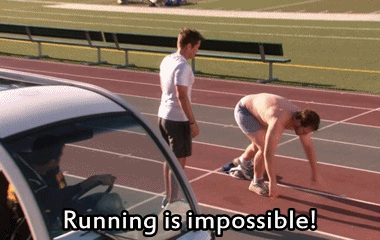I've quit every 100-mile race I've ever entered.
Often more than once.
Last year, at Superior 100, curled up in the fetal position on the trail in the middle of the night through Crosby Manitou, I quit at least 4 times. In both my finishes at Hardrock, I've quit by mile 30 (up on Handies or Krogers) only to get down low to the next aid station, smile, sit down with a cup of coke and some potato chips, and find myself relatively fine to continue.
"It never always gets worse."There's that saying, "Things are never as they seem." which is bullshit. Sometimes things are exactly as they seem. But more, things are always exactly as they are, we're just often very wrong.
I can split every long race I've ever run into three distinct races.
Part 1: "Running is amazing and I never want to do anything else."
Which is true... for the first few miles of every run. Some people need a few miles to "warm up"--those people are either fighting an injury or are overtrained. Who stretches before a run?! Crazy people, that's who.
CS Lewis said,
"If one could run without getting tired I don't think one would often want to do anything else."The problem, of course, is that you get tired--usually around the point where you run out of glycogen and are still trying to move at a pace that cannot be sustained by burning fat alone, often coming in waves corresponding to sugar consumption, assuming that you can still consume sugar, that your stomach hasn't shut down, and that you're not fighting your circadian rhythm (aka "the sleepies"), which brings us to the second race.
Part 2: "Running is impossible, this is stupid, everything hurts, and I'm dying."
That first race is a lie. I know you felt amazing at the beginning and your pace seemed nice and easy, but it wasn't, and now you get to pay for that... and it's expensive. Things get really hard for me the first time around mile 17, then again in the upper 30s. The hardest point in all of my 100-mile races is around mile 60, when the rest of the whole is still big and painful enough to sound really quite terrible and it's getting dark and I just want to sleep, until...
Part 3: "If he dies, he dies."
Sometime, usually around daybreak, or when I hit the marathon-left mark, something switches. The sleepies go away, and that fear of not having enough to finish kind of floats away. I think the Ivan Drago line comes to mind because of the callous disregard for another's (in this case, my own) well-being. Maybe it's just that things have finally stopped getting worse--the waves are gone and you're deep in the suck. I often say that I could be hit by a truck in the last 26 miles of any hundred and not care--I'll still finish, if only for the fact that any pain I have yet to sustain can't be worse than that I've already endured to get here.
People ask if I'm ever afraid of wolves or bears or cougars at wild or remote races, and I'm honestly not. So I have to punch a bear? Big deal. Do you have any idea how bad my feet hurt right now? (I don't even have feet.)
That second race, though.
If you have any wits left about you, ask yourself, "Will my future self regret not getting up and taking another step?" Though this can backfire--if you've finished the race before, or if you have another more important race coming up that you're "saving yourself for" (also bullshit)--but most often, future-you has a different perspective than current-you, and likely thinks that current-you is just being dramatic. Future-you knows that it always feels way better to suffer a bit longer so you can look back with a clear conscience--that is, if current-you lets future-you answer the question.
And current-you can be such a stubborn SOB.
Running blogs and podcasts all talk about running--but most biographically ("what happened?"). Sometimes they skirt around the edges of why we run or what makes us want to do it, but seldom do they talk about what (if anything) these lessons in suffering teach us about being better human beings. (Who were you? Who are you now? What were you once sure of that you now know you were wrong about?)
It's all in our mind anyway, how we perceive the world--but also how we perceive ourselves. I am not who I was, but is this who I am? Pirsig wrote,
"The truth knocks on the door and you say, 'Go away, I'm looking for the truth.' and so it goes away. Puzzling."And that's the actually-troubling part: as my perception inevitably changes, I'm left wondering, is this perception right, or just another figment on my journey towards some possible truth? How do you convince current-you that what you are right now might be a lie?
In the meantime, can you take another step? Good. Do that. You'll figure the rest out.



